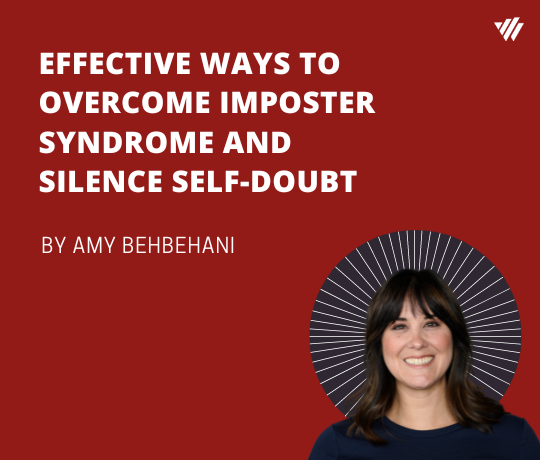Self-doubt doesn’t just go away. Combatting imposter syndrome takes work. So, how can you overcome it professionally? Amy Behbehani (Uplift, Inc.) has some advice.
-1.png?width=640&height=427&name=SB%20Preview%20Images%20(6)-1.png)
What Does Imposter Syndrome Feel Like?
Impostor syndrome. It’s an all consuming feeling of fear, anxiety, loneliness. It consumes you and betrays your judgment. It feels like stage fright. One minute, you’re all pumped up, feeling confident, then suddenly everything you thought you knew or prepared for is gone. You feel exposed. You work hard, and then when you’re asked to share your expertise, you suddenly forget that you ever had any. You feel naked, stripped of your worthiness, and you doubt that you know anything at all.
How I Realized I had Imposter Syndrome
The first time I experienced imposter syndrome, I was in grad school. I was a teacher’s assistant (TA) and it was my first day of class. I was a bundle of nerves. These “students” were more like my peers. I was only a few years older than most of them. What business did I have instructing them when I was merely a student myself? I was convinced they wouldn’t respect me.
I recall the first class vividly. I was wearing a green blouse. I recall this is because it was a light green that showed my anxiety in the form of severe perspiration. I didn’t realize how badly I was sweating until I went to write on the board (it was 13 years ago and chalkboards still existed), and saw how badly I was sweating. Suddenly I felt like everyone was staring at me, judging me. So, I haphazardly wrote on the board and eagerly dropped my arm. When I turned to face the students, I was shaking. I don’t remember how I moved past that moment. I wanted to run away and hide. I felt like a fraud.
How I Overcame My Self-Doubt
So how did I overcome it? I admitted I was nervous. I let the students know teaching was something new for me. This opened the door for mistakes to be ok. It reduced my anxiety to be perfect. Now, I frequently admit when I am anxious or when I don’t know something. It lets me be compassionate with myself and it also shows others that I am human. When I do this, I make sure to not preface with statements like “sorry for not knowing” or “this may be dumb to ask” because those statements are demeaning and signal that I’m insecure and lack knowledge to people who otherwise could have believed in me.
Imposter Syndrome Doesn’t Just Go Away
This technique is helpful, but it didn’t make my imposter syndrome go away. When I first started a supervisory role, I felt my doubts kick in again. In vision and strategy meetings with clinicians and executive leaders, I felt small. A persistent voice in my head kept saying, “You are not smart enough to be here, they are going to question your presence.”
Before one of these meetings, I admitted feeling nervous and inadequate to a coworker. She casually said, “Listen, you know your stuff. You are qualified. Why don’t you try writing down all of the things you know for certain about the topic of this meeting? It’ll remind you that you are qualified in this space and that you know what you are talking about.”
This exercise was incredibly effective. It calmed my nerves and affirmed that I knew what I was talking about. It filled me with confidence and silenced the voice in my head.
How I finally Got My Self-Doubt Under Control
A few years later, I transitioned into a director role and the voice made a reappearance. I was about 3 months into my new role and I felt like a total fraud. What business did I have being there? These people had years of experience in this field, why would they pick me? I thought they were going to find me incapable and regret hiring me.
I was in tears one day when I remembered the exercise I did when I became a supervisor. So, I whipped out my notebook and started writing down my accomplishments. Nothing grand, just little things that were specific about my job like tasks and projects that I had successfully implemented and felt proud of.
When I was done, I felt reaffirmed. I had concrete evidence of my worthiness. My doubt was put to rest.
That’s when I decided I needed to make this a recurring process for myself. I set reminders to write down my accomplishments. I didn’t just want to do this exercise when I was feeling low. I wanted to work on this when I was feeling confident so that I could prevent myself from falling into the despair of feeling like I didn’t belong. And, if I ever did, all I would need to do is open my notebook and read the evidence that proved my doubts wrong. This has helped me to be a stronger, more confident leader that others respect. It has also helped me be brave enough to pursue new adventures.
Now I write down my accomplishments regularly. I write down tasks or projects that I’ve completed, why it was important to me, and what kind of impact it made on others. It provides me with a sense of assurance that only I can give myself.
Beating Imposter Syndrome Starts with Self-Validation
It’s one thing to hear someone say that you’re worthy, that you’ve done enough, that you’ve earned your place. It’s another to believe it yourself. I feel like this process is a deeper version of self-affirmations. It’s more than telling myself “I am capable” or “I belong”. This process gives me a concrete connection to real things that I have done. It allows me to validate myself in a way that no one else ever could.



-Nov-07-2023-06-38-17-8684-PM.png)